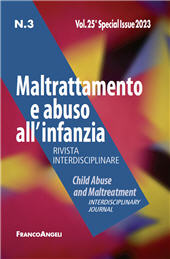Partecipazione ad eventi negativi e positivi e resistenza alla suggestionabilità
63-86 p.
Alcuni studi sulla suggestionabilità interrogatoria hanno evidenziato che la capacità dei bam-bini di resistere all'induzione suggestiva è favorita dalla partecipazione attiva all'evento. La nostra ricerca si inserisce in questo filone di studi con l'obiettivo di verificare se il coinvolgi-mento attivo in un evento connotato emotivamente (in senso positivo o negativo) rispetto alla semplice osservazione consenta la resistenza alle domande suggestive. Il protocollo di ricerca ha visto i bambini sperimentare tre diverse situazioni come osservatori di un evento (neutro) o come protagonisti ad un evento connotato negativamente (Partecipato-Negativo) o positiva-mente (Partecipato-Positivo). Tali eventi sono stati oggetto di 27 domande (aperte, misleading e tag) poste a distanza di una settimana e di un mese Alle prime due fasi della ricerca hanno partecipato 124 bambini di età tra 7 e 10 anni (età media = 8.56), di cui 58 femmine e 66 ma-schi, e alla terza fase 71 bambini.
I risultati hanno evidenziato differenze significative nella resistenza alla suggestionabilità in funzione del tipo di evento. In particolare a distanza di una settimana e di un mese, le domande relative all'evento Partecipato-Negativo hanno ricevuto un maggior numero di risposte corrette e il minor numero di risposte errate in connessione sia alle domande misleading sia a quelle tag. [Testo dell'editore].
Research studies on suggestibility have shown both how the ability of children to resist suggestive questions increases when they are the protagonists and not the mere observers of the event. Our research is part of this line of studies; it has the objective of analyzing whether resistance to suggestibility is favoured either by participation in the event or by the emotive connotation of the event. The research protocol was realized in three phases. In the first phase, the participants experienced three different events (neutral; negative-participated and positive-participated) in which they were involved as protagonists. After one week and after one month, the children were first asked to perform a free re-evocation and later interrogated on the three events by 27 questions (non-suggestive, misleading and tag).
The participants at first and second phases were 124 children of between 7 and 10 years (average age = 8.56), of whom 58 were girls and 66 boys. At thirth phase participated 71 children. The results show significant differences in resistance to misleading and tag ques-tions, which is connected to the type of event. In particular, after one week and one month, the questions on the negative-participated event received the greatest number of correct answers and the lowest number of incorrect answers, in connection with both misleading and tag ques-tions. [Publisher's text].
-
Articles from the same issue (available individually)
-
Information
ISSN: 1972-5140
KEYWORDS
- suggestionabilità, partecipazione, connotazione emotiva, bambini età scolare
- suggestibility, participation, emotional connotation, scholar children


